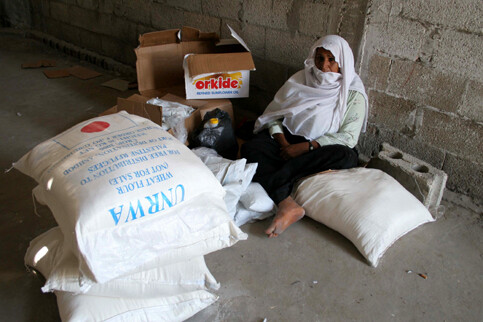The Electronic Intifada 28 July 2007

An elderly Palestinian refugee woman receives food aid from the United Nations Relief and Works Agency for Palestinian Refugees, in the Rafah refugee camp in the southern Gaza Strip, 17 July 2007. (Hatem Omar/MaanImages)
JERUSALEM, 27 July 2007 (IRIN) - “There is no doubt, Gaza is becoming aid-dependent,” said Liz Sime from CARE International, in light of the continued closure of all crossing points, except for basic food commodities and humanitarian aid.
With the borders shut, raw materials cannot get in and finished goods cannot be exported. Factories in the Gaza Strip are folding like dominos and unemployment is soaring.
“People hate having to ask for assistance. People want work,” said Sime. “They want aid in the form of job-creation programs.” Such programs may remain a pipe dream if the borders stay shut.
Sime was echoing statements by John Ging, the Gaza chief of the UN Agency for Palestinian Refugees (UNRWA), which is the largest aid provider in the strip.
“We expect that Gaza will become a near totally aid-dependent society, a society of people robbed of the possibility of self-sufficiency and the dignity of work,” he said at a press conference organized with Gaza business leaders.
While basic food supplies continue to make it into Gaza, WFP said prices of some commodities were rising, while farmers and fishermen could not export their goods, creating losses in those industries as well.
In addition, Israel’s Channel 10 recently reported that Palestinian importers had alleged that goods arrive spoiled, partly because of the long waiting time at the crossing.
“I am not saying the situation in Gaza is good,” said Shlomo Dror, from Israel’s Ministry of Defense, but he was “not convinced” the economy would irreversibly collapse.
“We are working to prevent a humanitarian crisis. But if the Palestinians have complaints, they should put pressure on Hamas.”
Business leaders concerned
Local industry leaders also expressed concern about a potential collapse of the private sector.
“In one month’s time there will be a complete economic collapse. And if the siege on the borders persists, it will take years and years to recover and rebuild the economy,” said Amer Hammad, from the Palestinian Federation of Industries.
About a third of Gaza, according to economic estimates, relies on government salaries for sustenance.
Although the Palestinian Authority paid some salaries recently, when Israel released frozen tax funds after 18 months, it is unclear if those payments can be sustained.
Another third of residents depend on income from the private sector and nearly all the rest are completely aid-dependent.
“A collapse of the private sector means that the half-million people in Gaza who rely on those salaries will be without income,” said Hammad.
About 1.5 million Palestinians live in Gaza, and 1.1 million already receive some food aid from UNRWA and WFP.
“All of Gaza will become aid-dependent,” Hammad predicted.
Nasser el-Helou, a businessman who is part of the Borders and Crossing Crisis Committee, said almost 70,000 people have lost their jobs in the last month, since the Islamist party Hamas took over Gaza and all borders were closed. This number continues to rise, as more factories shut down or cut back operations.
Living on aid
Sami al Hessi, from the Beach refugee camp in Gaza, was self-sufficient before the latest closures. Now he relies on UNRWA.
The sewing factory where he worked closed because it could not import the raw materials or export its products. “I can’t meet all my children’s needs these days. Whenever they ask, the answer is no,” said Al Hessi.
He said being dependent on aid has made this “the worst period of my life.”
He tried to find work within the fishing industry with his cousins, but, because of the Israeli restrictions imposed on fishermen, he had to give up.
This item comes to you via IRIN, a UN humanitarian news and information service, but may not necessarily reflect the views of the United Nations or its agencies. All IRIN material may be reposted or reprinted free-of-charge; refer to the copyright page for conditions of use. IRIN is a project of the UN Office for the Coordination of Humanitarian Affairs.


